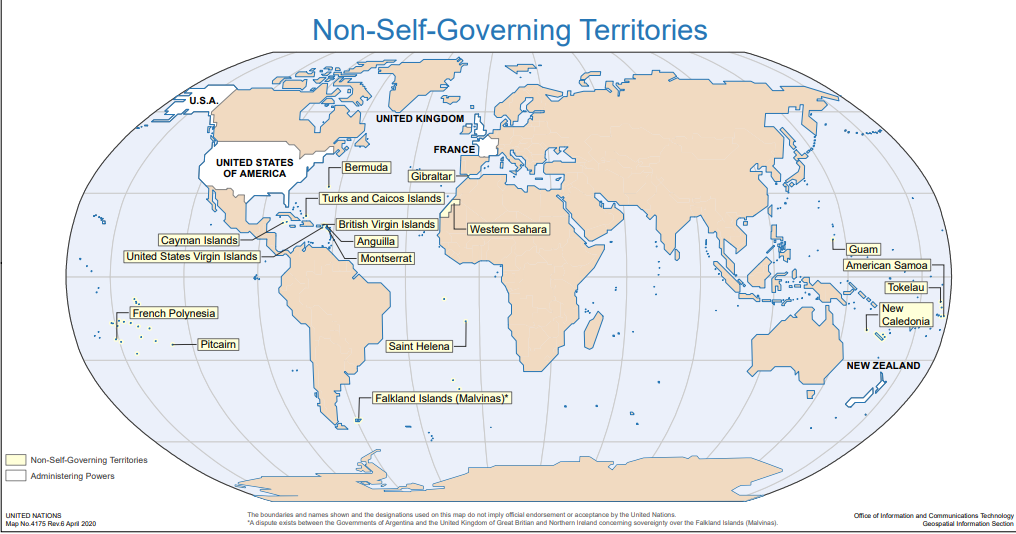UN: ‘Week Of Non-Self-Governing Territories’
Every year from May 25th to May 31st, the United Nations marks the “International Week of Solidarity with the Peoples of Non-Self-Governing Territories.”
The United Nations maintains a list of what they deem to be “Non-Self-Governing Territories”, and Bermuda is included, having been listed since 1946; with all the other British Overseas Territories are listed as well.
Along with Bermuda, the jurisdictions listed are Western Sahara, Anguilla, British Virgin Islands, Cayman Islands, Falkland Islands, Montserrat, St. Helena, Turks & Caicos, U.S. Virgin Islands, Gibraltar, American Samoa, French Polynesia, Guam, New Caledonia, Pitcairn, and Tokelau.
Map via the UN website of what they deem to be the “Non-Self-Governing Territories”
The United Nations said, “In the UN Charter, a Non-Self-Governing Territory is defined as a Territory ‘whose people have not yet attained a full measure of self-government.’
“In 1946, several UN Member States identified a number of Territories under their administration that were not self-governing and placed them on a UN list. Countries administering Non-Self-Governing Territories are called administering Powers. As a result of the decolonization process over the years, most of the Territories were removed from the list.
“Chapter XI of the UN Charter – the Declaration regarding Non-Self-Governing Territories – provides that Member States administering Territories, which have not attained self-government recognize “that the interests of the inhabitants of these Territories are paramount” and accept as a “sacred trust” the obligation to promote their well-being.
“Chapter IX urged the administering Powers concerned to take effective measures to safeguard and guarantee the inalienable rights of the peoples of the Non-Self-Governing Territories to their natural resources, including land, and to establish and maintain control over the future development of those resources, and requested the Administering Powers to take all necessary steps to protect the property rights of the peoples of those Territories.
“Administering Powers, in addition to ensuring the political, economic, social and educational advancement of the peoples, undertake to assist them in developing self-government and democratic political institutions. Administering Powers have an obligation to transmit regularly to the Secretary-General information on the economic, social and educational conditions in the Territories under their administration.
“From 1960 to 2002, 54 Territories attained self-government. At present, there are 17 Non-Self-Governing Territories remaining.
“The UN General Assembly, by its resolution 54/91 of 6 December 1999, requested the annual observance of the Week of Solidarity with the Peoples of Non-Self-Governing Territories.”
A UN Resolution on the ‘Question of Bermuda’ from December 2020 is below [PDF here]
Read More About
Category: All


